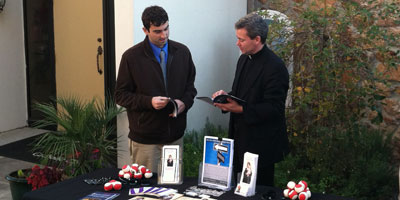
 CHARLESTON—A vocation isn’t just about a divine call to the priesthood; it’s about the summons that every Christian receives.
CHARLESTON—A vocation isn’t just about a divine call to the priesthood; it’s about the summons that every Christian receives.
This is why discernment is so important.
Father Jeffrey F. Kirby, vicar for vocations, said his department has created a four-year plan that addresses that issue and promotes vocations across the board. It has received the blessing of Bishop Robert E. Guglielmone and the support of the Presbyteral Council.
“This isn’t just a push for priests or religious life,” Father Kirby said. “The goal is God’s will. We hope we get some young men who realize they’re called to priesthood, young women called to sisterhood, but the goal here is for the Christian person to know where he or she is called.”  The plan lays out a detailed strategy that starts the discernment process in elementary school and accompanies children all the way through high school and college, and into young adulthood.
The plan lays out a detailed strategy that starts the discernment process in elementary school and accompanies children all the way through high school and college, and into young adulthood.
Accompaniment is Father Kirby’s primary focus, and involves dozens of creative ideas. Some are already proven to work, like vocations clubs that feed into discernment groups.
Other ideas are new, such as an after-school club for public school and homeschool students. The first one will be held at St. Mary Help of Christians School in Aiken with Sister Pamela Smith, SSCM.
Collaboration with the schools and all the other diocesan departments is a must, Father Kirby said, noting that the vocations plan requires an “all hands on deck” mentality.
Another strategic step involves the many ways to encourage discernment, such as social media. Rhett Williams, vocations assistant, said their web page, Facebook and Twitter are all linked and provide real time updates on their activities. It’s a great way to reach out, he added, and gives people a way to communicate back.
Parish visits, retreats, seminary visits and diocesan events are also a big part of the process. Father Kirby noted that every weekend the vocations office is somewhere, promoting the message and reaching out to everyone in the diocese.
“For this to be effective, every member of the church has to feel a certain ownership and make it their own so that we can all support the discernment of vocations, and then support those who are called to the priesthood and religious life,” he said.
Assessment is the last stage of the plan; when people make a decision about where God wants them.
“There is a particular focus of mine — which is within the context of this culture of openness to God’s will — that those who are called to priesthood or religious life will find the support and encouragement needed,” Father Kirby said.
